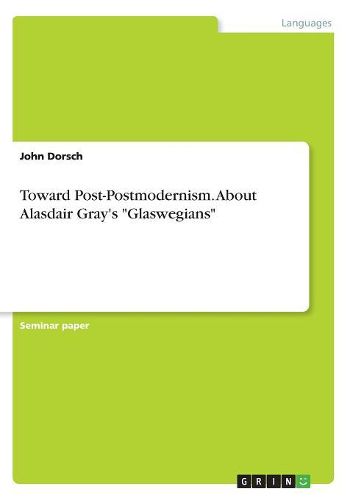Readings Newsletter
Become a Readings Member to make your shopping experience even easier.
Sign in or sign up for free!
You’re not far away from qualifying for FREE standard shipping within Australia
You’ve qualified for FREE standard shipping within Australia
The cart is loading…






Seminar paper from the year 2014 in the subject Literature - Comparative Literature, grade: 1,0, University of Tubingen, course: Dubliners and Glaswegians, language: English, abstract: Despite often being described as the prototypical author of postmodern literature, in a letter to Dietmar Boehnke, Alasdair Gray has this to say about postmodernism, "Post modernism seems the creation of scholars acquiring a territory to lecture upon." - thus ridiculing his status as a postmodern writer. In this paper, I'll work closely with Gray's short story collection, Glaswegians, and will interpret whether it is modern, postmodern, or post-postmodern. To assist my determination, I will investigate the history of the postmodern, dividing it into its philosophical and cultural vocabularies. The result of my investigation and interpretation is that Glaswegians is a post-postmodern work because, despite the play with what could be called a postmodern elements, it provides the reader with answers to postmodern dilemmas and points to something "outside the text".
$9.00 standard shipping within Australia
FREE standard shipping within Australia for orders over $100.00
Express & International shipping calculated at checkout
Seminar paper from the year 2014 in the subject Literature - Comparative Literature, grade: 1,0, University of Tubingen, course: Dubliners and Glaswegians, language: English, abstract: Despite often being described as the prototypical author of postmodern literature, in a letter to Dietmar Boehnke, Alasdair Gray has this to say about postmodernism, "Post modernism seems the creation of scholars acquiring a territory to lecture upon." - thus ridiculing his status as a postmodern writer. In this paper, I'll work closely with Gray's short story collection, Glaswegians, and will interpret whether it is modern, postmodern, or post-postmodern. To assist my determination, I will investigate the history of the postmodern, dividing it into its philosophical and cultural vocabularies. The result of my investigation and interpretation is that Glaswegians is a post-postmodern work because, despite the play with what could be called a postmodern elements, it provides the reader with answers to postmodern dilemmas and points to something "outside the text".